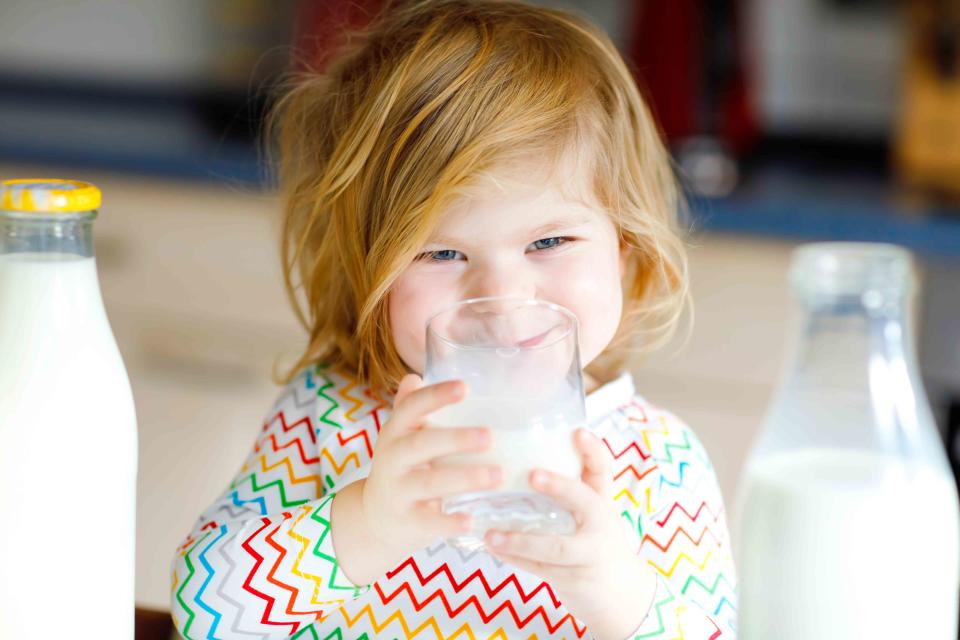How Much Protein Do Toddlers Need?
Protein is an essential nutrient for a child's growth and development. Here's how much protein your toddler should be eating.

Getty Images / romrodinka
In my years as a pediatric dietitian, I have seen many concerned parents who were worried that their babies and picky toddlers weren't getting enough protein. But how much protein does a 2-year-old need? How about a 1-year-old or 5-year-old?
For starters, it helps to realize that protein is a part of every single cell in the human body. It's vital for all growth and development, especially during childhood. Protein not only helps the body build cells and tissues, but it's also important for cellular repair and many different body processes, like the immune response, hormone production, and blood clotting. The Dietary Guidelines for Americans also explain that protein is crucial for brain health in developing toddlers.
In short, everyone—especially kids—needs protein in their diet in order to grow and develop. But it is possible to overdo it on protein. Here is your guide for how much protein a toddler needs.
Related: 7 Best Protein Foods for Babies
How Much Protein Does a Toddler Need?
So how much protein does a 1-year old, 2-year old, or 3-year old need? Overall, it might be less than you expect.
Recommended Daily Protein Intake for Toddlers
The American Academy of Pediatrics (AAP) recommends toddlers between the ages of 1 and 3 eat two servings of protein every day. Examples of protein sources that could fulfill a toddler's daily needs include one egg, 2 ounces of cheese, or 4 tablespoons of lean ground beef.
The AAP adds that if your 2-year-old is drinking the recommended 12 to 24 ounces of whole cow's milk (or cow's milk alternative like soy milk) every day, they are getting all the protein that they need, as 2 cups of dairy foods per day will cover about 120% of their protein needs.
The Dietary Guidelines for Americans also explain that if your toddler is still drinking breast milk, their protein needs from solid food may be even less, as human milk contains protein. However, the AAP does encourage the shift from breast milk to food as your child's main source of nutrition in the toddler stage.
Sources of Protein for Toddlers
When solids are introduced and babies start drinking less formula or breast milk, it's time to incorporate more protein-rich foods into your child's diet.
Here are some protein-rich foods the AAP recommends for toddlers:
Beans
Cheese
Cow's milk or soy milk*
Fish
Lentils
Meat
Nut butters
Seed butters
Tofu
Yogurt
Whole-grain pasta
*Only recommended for children over 12 months of age.
As an added bonus, high-protein foods like meat and beans also provide iron and zinc, which are essential nutrients for babies.
While cow's milk and other dairy foods are good sources of protein, experts recommend limiting dairy to two to two-and-a-half servings per day for toddlers. One serving of dairy is equivalent to 8 ounces of milk, 8 ounces of yogurt, or 1.5 ounces of hard cheese. (Remember: Cow's milk is not recommended for babies under 12 months of age.)
Related: An Age-by-Age Guide to Nutrition for Kids
Can a Toddler Eat Too Much Protein?
Protein is an essential nutrient for toddlers, but is there such a thing as too much protein? While there isn't a lot of good research, one 2018 study did find a link between a diet high in protein in the first 24 months of life and a higher risk of being overweight or obese later in life.
However, the study primarily found that the only type of protein associated with faster growth and risk for excess weight was dairy protein, found in many kinds of infant formula, cow's milk, cheese, and yogurt. This finding suggests that excess protein from meat or vegetables could be off the hook. Additionally, the research was not clear enough to prove a definitive link or say how much protein is "too" much protein for babies and toddlers.
In general, parents and caregivers can focus on offering their toddlers well-balanced meals and snacks that include all the food groups with proteins, vegetables, fruits, whole grains, and healthy fats.
Related: The 18 Best Foods for Babies and Toddlers
Should I Be Worried About My Toddler Eating Enough Protein?
Chances are, there's no need to worry about your child getting too little protein unless they are a very selective eater and forgoing all dairy and other protein-rich foods.
Of course, if your doctor suggests that your baby or toddler needs some catch-up growth or requires more protein due to a medical condition, work with your medical team to put together a customized plan to ensure your toddler gets the nutrition they need for their own unique development.
Key Takeaways
Protein is crucial for baby and toddler development. While babies under 6 months get all the protein they need from breast milk or formula, older babies and toddlers require protein from whole foods as well. In general, experts recommend that toddlers between the ages of 1 and 3 should eat two servings of protein per day, though some toddlers may need more or less. Talk to a pediatric health care provider if you're concerned about your child's diet and protein intake.
For more Parents news, make sure to sign up for our newsletter!
Read the original article on Parents.

